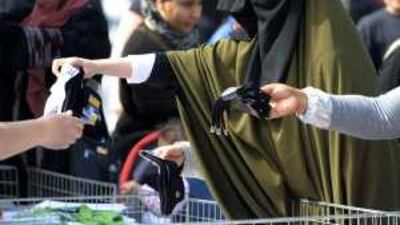LONDON // Imminent bans to be imposed in France and Belgium on women wearing the burqa or niqab in public will trigger legal challenges likely to last for years, lawyers predicted yesterday. Muslim and human rights groups are determined to fight the bans in national and international courts, basing their claims on an individual's right to choose and religious freedom of expression. Belgium legislators were expected to approve a bill that would outlaw the wearing of veils or any other facial coverings in public unless approved by the police.
However, the collapse of the coalition Belgian government in an unrelated row between Flemish and French-speaking parties led to the suspension of parliament hours before the vote was due. The bill is expected to be reintroduced in the Chamber of Deputies as soon as a new government is formed, possibly as early as Thursday. Under the new law, someone wearing a veil could be imprisoned for up to a week or fined.
Meanwhile in France, the president Nicolas Sarkozy has promised that a similar bill to the Belgian one would be laid before ministers within the coming month. "Face-covering veils must be totally forbidden in the whole public space because women's dignity is not divisible," said Luc Chatel, a spokesman for the French president. "Wearing a full veil is a sign of a community closing in on itself and of a rejection of our values."
However, the Council of State, a government body that advises the French government on legal matters, has already warned that such a ban could be unconstitutional. It has suggested that any ban be limited to a specific list of public buildings, such as schools and tax offices, but Mr Sarkozy has rejected the advice and says a legal prohibition must apply to all public places. SOS Racisme, a French human rights group, says such a law "contravened the constitution and the European Convention on Human Rights".
Similarly, Amnesty International believes the bans would break international law. "A general ban on the wearing of full face veils would violate the rights to freedom of expression and religion of those women who choose to express their identity or beliefs in this way," said Claudio Cordone, Amnesty's acting secretary general. "Women must not be compelled to wear a headscarf or veil, either by the state or by individuals. And it is wrong for them to be prohibited by law from wearing it."
Lawyers for human rights and Islamic groups are now preparing to challenge the bans in both national courts and, eventually, the European Court of Human Rights. "Bans like this lead to a lose-lose situation," said Judith Sunderland, the senior Western Europe researcher at Human Rights Watch. She said there was no evidence that wearing the full veil in public threatened safety, public order, health, morals or the fundamental rights and freedoms of others.
"At a time when Muslims in Europe feel more vulnerable than ever, the last thing needed is a ban like this, treating pious Muslim women like criminals won't help integrate them." However, there are believed to be many among France's five million Muslims - mainly of North African origin - who are not opposed to the ban. Only about 2,000 women in France are thought to wear the burqa or niqab, and most of those are indigenous French women who have converted. In Belgium, the number is thought to be only 200-300.
The veils are much more common in the UK, but none of the three major parties there is planning to legislate for a ban. Even if Belgium and France ride out the legal challenges and eventually implement the bans, there remain grave doubts over how enforceable they would prove to be. Under the French proposals, stores could refuse entry to women wearing veils and police officers could demand they be removed and impose fines equivalent to up to Dh3,700 if they were not.
Gérard Collomb, the mayor of Lyon, has stated that his police force doubts that the law could be enforced, while Jean-Paul Delevoye, the state ombudsman in France, has described the total ban in public places as "excessive". He also questions how the ban will be imposed on tourists. "I don't know what we are going to do with Saudi women who go shopping on the Champs Elysées," he said. @Email:dsapsted@thenational.ae

